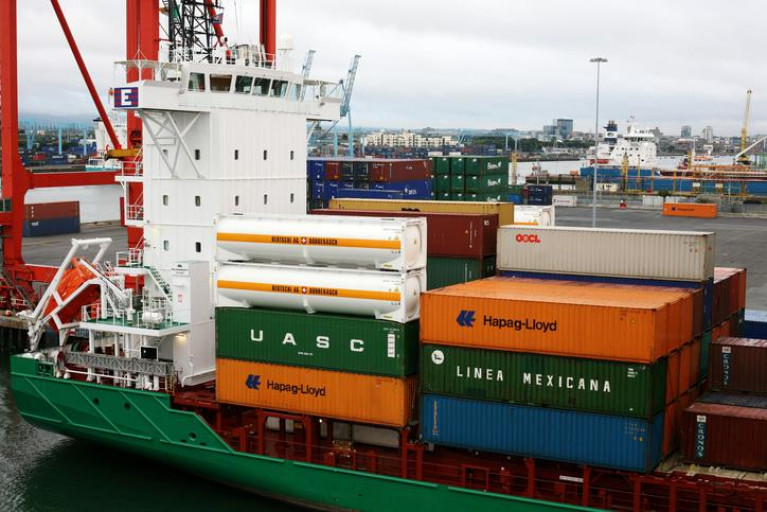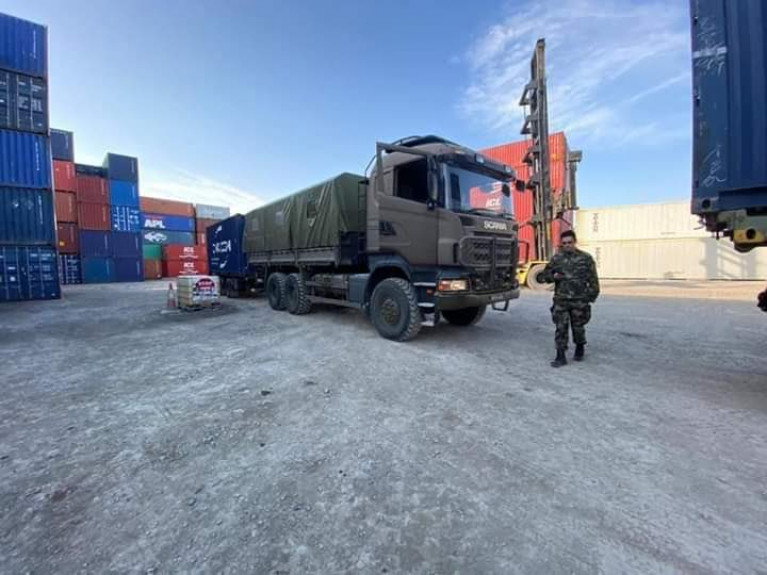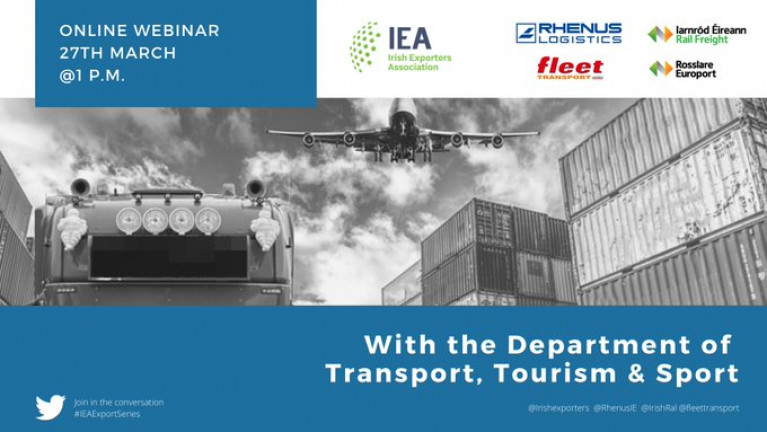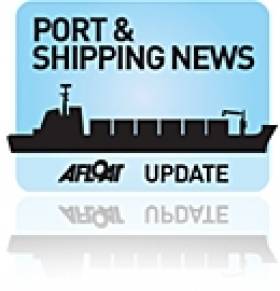Displaying items by tag: dept of transport
A document providing Covid-19 information relating to the Maritime Sector in Ireland has been recently released by the Department of Transport, Tourism, and Sport.
The 26-page document titled “Maritime Sector COVID-19 related information” was released by DTTAS on Friday and provides Frequently Asked Questions (FAQ).
Among the headings contained is relevant information on issues such as seafarer certification, national and EU measures being taken in addition to information on the ports and shipping services.
The document can be downloaded in a PDF format from this LINK.
To consult more from the Department, click the DTTAS homepage here.
Dept. of Transport Issue Covid-19 Guidance Measures Among them Maritime Transport Sector
The Department of Transport, Tourism & Sport (DTTAS) has issued transport related measures (incl. Maritime) currently in place in response to Covid-19 which are set out below.
DTTAS added given that this is a rapidly evolving situation this page (click HERE) will be updated as required.
As for the central online Government hub to view the latest information on how Ireland is responding to cases of Covid-19.
Among the guidlines are detailed below concerning the Maritime Transport sector and those associated from hauliers using Irish Ports, their dockers and staff etc.
Maritime Measures
Cruise ship travel
All scheduled cruise ship travel has ceased. The National Health and Emergency Planning Team agreed that no cruise ship will be permitted to enter any Irish port or anchor in Irish waters.
Marine Notice No.6 of 2020 COVID-19 (2019nCoV) - Maritime Declarations of Health
This Marine Notice communicates instructions from the Health Service Executive (HSE) on the submission of Maritime Declarations of Health.
Marine Notice No.14 of 2020 Temporary Contingency Planning for Certification of Seafarers - COVID-19
This Marine Notice sets out the temporary measures being put in place in relation to the validity of seafarers’ documents impacted as a result of the COVID-19 pandemic: to extend the validity of Irish seafarer certifications (by 6 months) and Irish flagged vessels (by 3 months) which remove administrative issues for those seafarers and vessels requiring renewal over the coming 3 months.
Marine Notice 15 of 2020 Temporary Contingency Planning for the Surveying and Certification of Irish Registered Ships –COVID-19
This Marine Notice sets out temporary contingency measures put in place to extend the validity of ship certificates where a survey cannot be carried out in advance of the expiration of the certificate. This includes provision for intermediate surveys and inspections.
For much more information as alluded above, consult the Gov.ie website HERE In addition the Dept. of Agriculture, Food & Marine (homepage) web here.
Irish Exporters Assoc & Dept. of Transport to Host Webiner to Discuss COVID (Join In Online)
The Irish Exporters Association (IEA) announced yesterday in conjunction with the Department of Transport that tomorrow (Friday, 27 March at 1300) they are to hold a webiner to discuss the latest COVID-19 situation.
A Q&A session will be part of the 1-hour long lunchtime webiner where you can join in the discussion online, noting webiner requires registration by online by clicking this LINK
Speakers at the webiner will be:
Eddie Burke, Principal Officer, EU and Central Policy Division, Dept. of Transport the Department of Transport, Tourism & Sport (DTTAS).
This is to be followed by a Q&A session with:
• Eddie Burke, Principal Officer, EU and Central Policy Division
• Mary Dunning, Principal Officer, Maritime Transport Division,
• Claire Martinez, Principal Officer, Road Transport and Maritime Freight Division
Afloat adds the DTTAS releases Marine Notices for 2020, to consult all online click HERE.
Among them as Afloat reported yesterday, some recent notable notices (repeated below) for the Ports & Shipping sectors
Marine Notice No. 14 of 2020
Temporary Contingency Planning for Certification of Seafarers –COVID-19 (click to download)
In addition Marine Notice No. 15 of 2020
Temporary Contingency Planning for the Surveying and Certification of Irish Registered Ships –COVID-19 (click to download)
Also available from DTTAS is Important Health Information on symptoms, public health advice, social distancing and how to prevent the spread of COVID-19 (Coronavirus) - click HERE
Irish ships will now be considered of the highest quality and will be subject to less inspections in ports throughout the region following an international meeting in Dublin today.
The Paris Memorandum of Understanding on Port State Control (Paris MoU) held its 43rd Committee meeting in Dublin, Ireland from 10 - 14 May 2010. The meeting was held in the Dublin Castle Conference Centre and was opened by Minister of Transport Mr Noel Dempsey TD. The meeting was chaired by Mr. Brian Hogan (Chief Surveyor of the Marine Survey Office), at the Department of Transport.
The Paris MoU adopted the new "Black/Grey/White List" which is the international league table of maritime flag states. Ireland is on the white list of best performing States and moved from 19th on the list to 8th place this year. This means that Irish ships will now be considered of the highest quality and will be subject to less inspections in ports throughout the region. This will have positive financial consequences for the Irish shipping industry.
The meeting adopted the "New Inspection Regime" (NIR), which is a groundbreaking development in Port State Control. The New Inspection Regime, which will enter into force from 1 January 2011, and will replace the existing Port State Control system. The NIR was developed following a process of review of the existing Port State Control mechanism. The NIR is a significant departure as it is a risk based targeting mechanism, which will reward quality shipping with a smaller inspection burden and concentrate on high-risk ships, which will be subject to more in-depth and more frequent inspections. The NIR is based on the latest developments at the International Maritime Organization, IMO, and makes use of company performance and the IMO audit for identifying the risk profile of ships together with the performance of the flag State and the recognised organisation. The past inspection record of the ship as well as the ship's age and ship type will influence the targeting. Full implementation of the system will rely on collection of port call information. The NIR will be accompanied by a new information system "THETIS" which will replace the current SIReNaC information system.
The Committee looking ahead and recognising that the International Labour Organisation's Consolidated Maritime Labour Convention, 2006, MLC 2006, may enter into force from 2011 onwards considered draft guidelines for Port State Control Officers in respect of the implementation of the Port State Control requirements of the Convention. These guidelines will be based on the MLC 2006 and should become a practical tool for inspections on working and living conditions and will ensure that seafarers will be protected. The Committee also adopted new guidance on control of International Safety Management, ISM, Code requirements, taking into account experience gained since the entry into force of the ISM Code. The Committee continued to take actions in response to the 2nd Joint Paris/Tokyo MoU Ministerial Conference, held in Vancouver in 2004 and agreed that all actions have been completed or will be monitored on a continuous basis.
The results of the Concentrated Inspection Campaign on Lifeboat Launching Arrangements were considered by the Committee and it was agreed that the evaluation will be submitted to the International Maritime Organization in 2011. From September to November this year the Paris MoU will focus its campaign on damage stability of oil tankers, which is seen as an important issue and the results will be communicated to the international shipping community.
The Paris MoU has increasing relations with port State control regimes in other areas of the world. The meeting heard reports from the US Coast Guard, the Caribbean MoU, Black Sea MoU, Riyadh MoU and Tokyo MoU. The International Labour Organization was also represented and provided updates. Malta and Croatia will join the MoU Advisory Board (MAB) of the Paris MoU for the coming 3 years and the Committee thanked the outgoing MAB members Russian Federation and Sweden for their positive contributions over the past period.
ENDS
































































